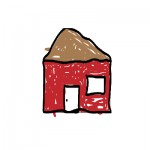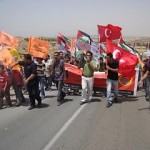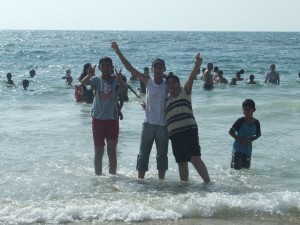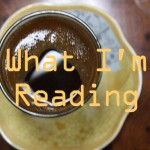
This year wasn’t my first Thanksgiving abroad, a holiday that is oh-so-North-American that celebrations overseas usually take on a little local flavor. In Kerala, India we were treated to curried barbeque chicken and the most delicious mashed potatoes I may ever taste. I wore a navy blue churidar to that meal. In Dublin, our Irish hosts had a special meal cooked up for our group of college students on a social justice study trip. We arrived after dark and left patches of snow on the carpeted stairs as we tromped up to the second floor, where we ate family-style. In Rome, I wore chic black and ate Chinese food at a restaurant in Monte Mario. Each time, the food was warm and delicious and I felt thankful to be among friends thoughtful enough to make Thanksgiving part of their week.
This year I celebrated Thanksgiving with hummus and pita in Bethlehem, Palestine while my Mom and younger brother made prime rib and Yorkshire pudding in Madison, WI. They probably talked about his latest rugby game and her projects at work and their upcoming trip to the Holy Land for Christmas. Pete fixed a few things in the house and carried the water softener salt to the basement while Mom set the table with festive placemats and a bouquet of enormous sunflowers. It probably smelled like slowly cooking meat and the house felt warm and cozy, at least in the rooms where Mom didn’t close the vents to save energy. Van Morrison probably crooned on speakers throughout the house. They might have remembered little Briggs, the ancient cat who blessed my family with her tiny presence from my childhood into my young adulthood. Though her little legs were atrophied in old age, she continued to launch herself with reckless abandon over sofas and between our legs, and proceed to sleep for hours with the same reckless abandon that got her to her latest perch.
Thanksgiving, even more than Christmas, is a time when going home is about just that – going home. There aren’t gifts or mad shopping-sprees to make you sweat with pressure. It’s a time to cook extravagantly and eat American-ly, and then sleep with the reckless abandon only possibly during a long weekend.
Once I left home for college, returning home make me conscious of what it felt like to be home, something I had taken for granted when I was always there. I realized that it smelled like detergent and wood and a constantly brewing pot of Red Rose tea. Mom would make up my bedroom with clean sheets, often placing a small vase of fresh flowers on my nightstand. I’d return to school realizing that no, I wasn’t actually Buddhist, and the guy I was dating was a materialistic yahoo and that I should take an afternoon and go to the Art Institute to absorb inspiration and realize my vast potential.
Home, no matter where you are, is a place of rejuvenation and encouragement, solace and stability, family and peace. When I asked friends what home means for them, whether American or Palestinian, their responses were fed with the same nourishing sentiments.
“Home is safe, caring, giving and can be anywhere as long as it’s a place where one can feel alive.â€
“There is a song that says that home is where I’m loved, which is turning out to be the most true definition of home for me. Until I reach my own definition of the physical meaning of the home, I would say that my home is the virtual space where I’m comfortable. It could be a nice gathering in the evening or it could be a sweet late phone call with someone you love.”
“A place to be carefree without worries. Being with family. The only door that is always open when other doors are closed. Home is a place where one finds peace, solitude, serenity, tranquility and enjoys his time regardless of how trivial his lifestyle is, he still finds it to be sublime.â€
“Home equals warmth, love and encouragement. It’s where you can just be you.â€
“Home is where the heart is and where you make it a place of welcome. It is a place where family and friends can come any time…and there will be food.”
Home is hardly ever about the actual structure, it’s about the feelings you have when you are there. That is, until the structure itself is at risk.
My apartment in the West Bank is within spitting distance of The Wall near Rachel’s Tomb. When I look out my bedroom window, I see it wrapping around the other side of my building, up the hill next to Aida Refugee Camp. Heavy cement blocks soar up to 25-feet-tall with metal fencing on top, the kind that protects innocent outsiders from dangerous prisoners inside (I’m on the inside). I have three bedrooms, two bathrooms, a huge kitchen and a living room that seats nine because the family that used to live here moved out when The Wall was built. Their store on the first floor failed because the street was difficult for shoppers to access and their view was, suddenly, demoralizing rather than breathtaking.
Fear and resignation are emotions I don’t relate to when I think of my home, but for some of my Palestinian friends this is their reality at home.
Once, I was invited to dinner during Ramadan at a friend’s house in a village called Sarra, situated near Nablus on the top of a hill and surrounded by Israeli settlements on all sides. As we walked through the village, my friend expressed pride in the beauty of her neighborhood. She pointed to her house from far away, “That is my home.â€
The house was gorgeous, with a special room for the eldest daughter to teach English to kids in the village. The three daughters shared a pink bedroom. Her father, a taxi driver, came home just for dinner and then returned to work until nearly midnight. He cracked jokes and his daughters poked fun at him during dinner. He fed his wife a piece of bread with a look of admiration and adoration on his face. He made the best of the few minutes he had with his loved ones, relaxing in the home he created with them.
We sat on their porch to eat, sitting elbow to elbow on a mat that wrapped us around the generous meal. In the distance, I noticed a growing flame. Olive trees were on fire. I looked around at the family members when we all noticed and saw on their faces something frightening, resignation. They were so accustomed to watching their land burn, that they were resigned to it. We watched an Israeli army jeep drive past the fire, doing nothing about the huge flames burning innocent olive trees, the crops and livelihood of Sarra villagers. We continued to eat as the land burned.
Yesterday I visited Wadi Rahal, a beautiful village nestled among sloping hills and surrounded by olive trees just a few kilometers from Bethlehem. We drove the winding path from route 60 to the village, the foundation of The Wall followed us. When built, The Wall will separate the village from its own olive trees. It will sit 10 meters from the village’s one school. It will cut off the village from the highway. I met with two college students, both activists doing their best organize weekly demonstrations and train the village in non-violent ways to resist The Wall.
They said that, about twice a month, Israeli soldiers enter one of the homes in the village in the middle of the night to do a search. They use the butt of their machine guns to bang on the door. If it isn’t opened in time, they break down the door. They wake up the entire family and search the entire house, breaking dishes and wreaking havoc. One of the guys said if he hears any noise at night he believes it is the army and it scares him. His home does not feel safe.
Each Thanksgiving, many recognize that the holiday symbolizes a loss of land and livelihood for one group of people and the victory of another. While I stare at The Wall from my kitchen window, I think about my neighbors in Aida Refugee Camp, who were kicked out of their homes in 1948 so that Israeli families could have a homeland. I am thankful that during my Thanksgiving dinners at home, I have never looked out the window to see our trees burning down. I am thankful that I can sleep, with reckless abandon, after a huge turkey (or prime rib) meal, knowing that I don’t need to feel scared. My home smells like detergent and wood and Red Rose tea, and I’m not afraid of losing it.
Most of the time I feel that the conflict for a home in Israel and Palestine is too complicated to ever truly grasp, but sometimes, like on Thanksgiving, it seems pretty simple.



